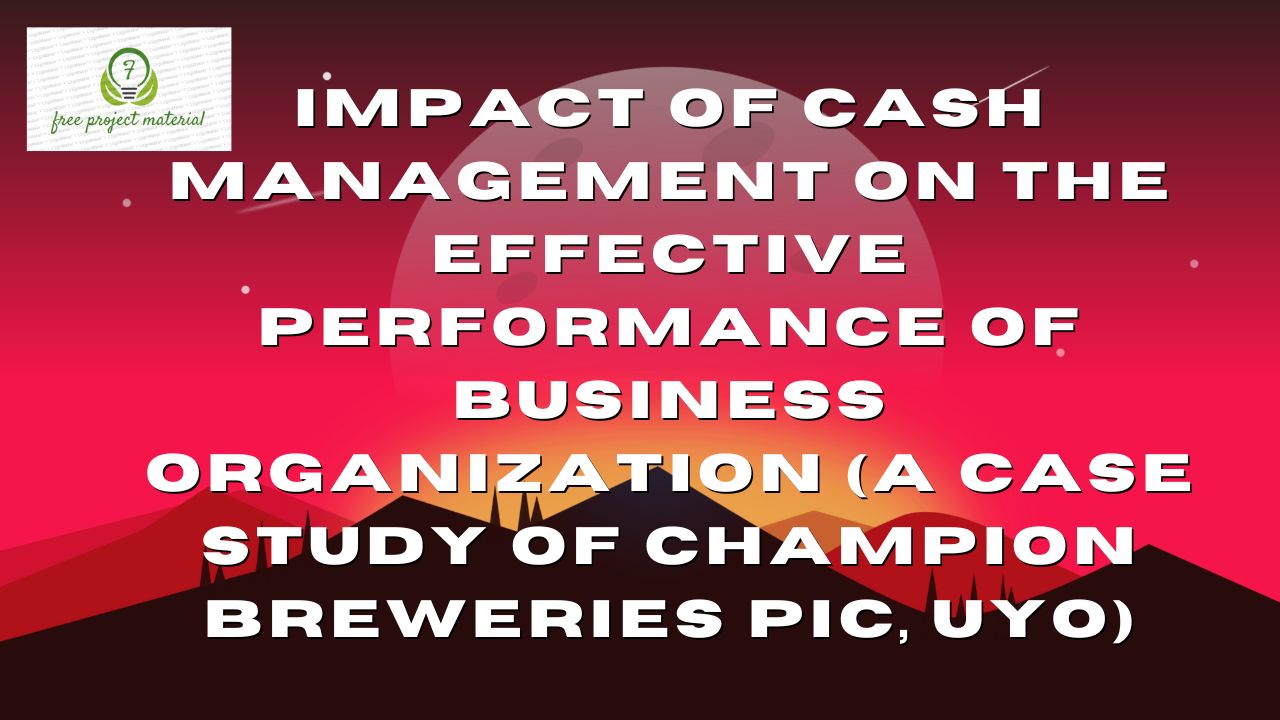ABSTRACT
This study focused on the impact of cash management on the effective performance of business organization using champion Breweries PLC, Uyo as a case study. To accomplish the research objective, the study adopted a survey research design which Taro Yamane formula was used to determined one hundred and five (105) respondent as sample size for the study. Instrumentation of the study was a self-developed administered. Data collected were analyzed with the used defective statistics involving the use of simple percentage and frequently tables. This study revealed that that cash management affect the effective performance of business organization through speeding up of the operation of the business, boosting profit margins, detecting cash embezzlement and speeding the working capital cycle. It also revealed that the impact of cash management on the profitability of business organization includes reduction of liquidity rate, optimum investment, efficient utilization of resources, effective performance of productivity. Findings also revealed that the problems facing Cash management on the effective performance of business organization include, too low of cash, too high of overhead, imbalance of outgoing and incoming credit terms and missing of payment account by customers. Finally findings reveals that the motive for holding cash in business organization, include transaction motive, precautionary motive, speculative motive and compensative motive. It was recommended that cash budget should be adopted and cash management plans should be shared with the organizational team.
LIST OF TABLES
Table 4.1.1 Response to Research Question (1)……. 37
Table 4. 1.2 Responses to Research Question (2). …. 39
Table 4.1.3 Response to Research Question (3)…….. 40
Table 4. 1.4 Responses to Research Question (4)……. 41
TABLE OF CONTENT
PAGES
Title page – – – – – – – – i
Approval page – – – – – – – – ii
Certification- – – – – – – – – iii
Dedication- – – – – – – – – – iv
Acknowledgement- – – – – – – – v-vi
Abstract- – – – – – – – – – vii
List of tables- – – – – – – – – viii
Table of contents- – – – – – – – – ix
CHAPTER ONE
INTRODUCTION
1.1 Background of the study- – – – – – – 1
1.2 Statement of the problem- – – – – – 2
1.3 Objective of the study- – – – – – – 3
1.4 Research Questions of the study- – – – – 4
1.5 Significant of the study- – – – – – – 4
1.6 Scope of the study- – – – – – – 5
1.7 Limitations of the study – – – – – – 5
1.8 Organizations of the study- – – – – – 6
1.9 Definition of the terms- – – – – – – 6
CHAPTER TWO
REVIEW OF RELATED LITERATURE
PREAMBLES – – – – – – – – 8
2.1 Conceptual framework – – – – – – 9
2.1.1 Meaning and concept of cash management – – – 9
2.1.2 Element of cash management – – – – – 13
2.1.3 Impact of Cash Management on Business Profitability – 14
2.1.4 Problems Associated with Cash Management
Business Organization – – – – – – 18
2.1.5 Possible Solution to Problem Associated
with Cash Management – – – – – – 20
2.1.6 Reasons for Holding Cash in Business Organization – 22
2.1.7 Roles and Functions of Cash Management in
Business Organization – – – – – – 25
2.1.8 Risk of Cash in Business Organization – – – 26
2.2 Theoretical framework – – – – – – 27
2.2.1 Free Cash Flow Theory – – – – – – 27
2.2.2 Cash Conversion Cycle Theory – – – – – 28
2.2.3 Baumol Model Approach – – – – – 29
2.2.4 The Miller-orr Model Approach – – – – 29
2.3 Empirical Reviews – – – – – – 30
CHAPTER THREE
RESEARCH METHODOLOGY
PREAMBLE – – – – – – – – 32
3.1 Research Design – – – – – – – 32
3.2 Population of the Study – – – – – – 33
3.3 Sampling Technique – – – – – – 33
3.4 Sample Size – – – – – – – – 33
3.5 Instrumentation – – – – – – – 34
3.6 Plan for Data Analysis – – – – – – 34
3.7 Problem of Data Collections – – – – – 35
CHAPTER FOUR
ANALYSIS, INTERPRETATION AND DISCUSSION OF FINDINGS
PREAMBLE – – – – – – – – 37
4.1 Analysis of Research Questions – – – – – 37
4.1.1 Research Question One – – – – – – 37
4.1.2 Research Question Two – – – – – – 38
4.1.3 Research Question Three – – – – – 40
4.1.4 Research Question Four – – – – – – 41
4.2 Discussion of findings – – – – – – 42
CHAPTER FIVE
SUMMARY, CONCLUSION AND RECOMMENDATION
PREAMBLE
5.1 Summary of findings – – – – – – 45
5.2 Conclusion – – – – – – – – 46
5.3 Recommendations – – – – – – 47
References
Appendix I
Appendix II
CHAPTER ONE
INTRODUCTION
1.1 BACKGROUND OF THE STUDY
Cash management is essential to every business that desires to meet up with its short-term financial obligations. Akinsulire, (2013) asserts that the success of any business venture is predicted on how the management had planned and controlled its cash flows. According to Olowe, (2018), cash management is concerned with the efficient management of cash in the firms working capital. Cash represents the basic input necessary to start and keep a business running.
The pattern of the cash and operating cycle varies per industry, but in general term, the pattern involves the provision of cash as capital for firm’s initial outlay. The procurement of raw materials in manufacturing companies distribution of the finished goods obtain immediate cash or create debtors when goods are sold on credit term (Akinbuli, 2019). Furthermore, the process of managing cash has become a major challenge for most of the companies, because of its significant impact on the results of a company (Ekwere, 2012).
The success of any business venture is predicted on how the management has planned and controlled it cash flows (Akinslire, 2013). Effective cash management is the fundamental standing point to ensure that the firm’s finances are in strong position. Further the cash management is very vital for production firms whose assets are mostly composed of current assets (Hornead Wachobwity, 2015). According Rahaman and Nasit, (2017) said that cash management contributes positively to the performance of firms and their survival. Deloof, (2013) said that cash management is an impact source of competitive advantage of business.
A company needs to maintain sufficient cash to keep its business running smoothly. Cash shortage will disrupts the firm’s operation and can even lead to insolvency. Excessive cash will tie down unnecessarily long-term capital with a result that the return on capital employed will be low. A firm thus needs to maintain sound cash position.
1.2 STATEMENT OF THE PROBLEM
It is almost impossible to have a business concern that does not encounter cash problem. This problems are aggravated today in Nigeria by the economic crisis and various government policies which directly or indirectly affect the cash that a business organization holds at any point in time. This make it mandatory for the business organization to manage their cash efficiency to ensure an optimal level of cash. Business organization are always faced with the problem of how to hold small or large amount of cash. This however is as a result of the fact that holding too much cash makes the organization loose the profit that would have accrued if such excess cash was invested. Similarly, insufficient cash can disrupt the activities of the business organization. It is in light of this that the study is being carried out to strike a balance between holding too little cash and holding too large amount of cash, in other wards we are trying to determine the optimum cash balance or level which is the point where cash management is efficient.
1.3 OBJECTIVE OF THE STUDY
The main objective of the study is to examine the impact of cash management on the effective performance of business organization while the specific objective are:-
- To examine the extent to which cash management can affect the effective performance of business organization.
- To examine the impact of cash management on the profitability of business organization.
- To examine the problem facing cash management on effective performance on business organization.
- To examine the motive for holding cash in business organization.
1.4 RESEARCH QUESTIONS
The following research questions were formulated to guide the study.
- To what extent dose cash management affect the effective performance of business organization?
- What are the impact of cash management on the profitability of business organization?
- What are the problems facing cash management on effective performance of business organization?
- What are the motive for holding cash in business organization?
1.5 SIGNIFICANCE OF THE STUDY
- To management of organization: This study would enable management of business organization know the consequences of not having and operating an efficient cash management system. It will also expose the management of business organization to effective way to manage cash towards the achievement of the organizational goals.
- To student and other researchers: This study will be useful to student and other researchers who will find this study as reference materials.
1.6 SCOPE OF THE STUDY
The scope of the study is to examine the impact of cash management on the effective performance of business organization a case study of Champion Breweries Plc, Uyo Akwa Ibom State.
1.7 LIMITATIONS OF THE STUDY
The following were the limitations of the study:
Financial constraint: Financial inadequately was the major limitation of the work. The researcher was financially dependent as a student. The need for materials, trips and logistics needed for this research was not adequately provided.
Time constraints: While embarking on this study, the researcher was having lectures, preparing for examinations, engaging in such activities and domestic work as well. Thus, time constraint was also a major limitation for the study.
Material constraints: The study was also limited in materials which made the researcher not to obtain all the necessary data for the study.
1.8 ORGANIZATION OF THE STUDY
The research work is organized into five chapters: Chapter one centered on the introduction and comprised the background of the study, statement of the problems, objective of the study, research questions, significance of the study, scope of the study, limitation of the study, organization of the study and definition of terms.
Chapter two reviews related literature: that is, the contributions of different scholars as it relate to the study. It also deals with theoretical frame work, empirical review and research gap. Chapter three deals with the research design and methology.
Chapter four takes care of data presentation, analysis and interpretation as well as discussion of findings.
Chapter five encapsulate the summary of findings, conclusion and recommendations.
1.9 DEFINITION OF TERMS
The following terms used in the study are operational defined:
- Impact: The effect or results created by something
- Cash management: Is the corporate process of collecting and managing cash as well as using it for (short term) investing.
- Cash: This is an amount of money used or needed to buy or purchase an item.
- Profitability: This can be define as a business ability to produce a return on an investment based on its resources in comparison with an alternative investment.
- Plan: This is the process of setting objectives or target and finding ways to accomplish them.
- Optimum: This is the best possible outcome within a given set of circumstances.
- Corporate: This means relating to large companies, or to a particular large company.


